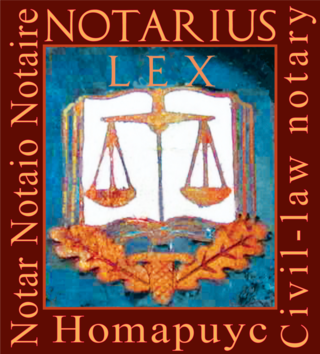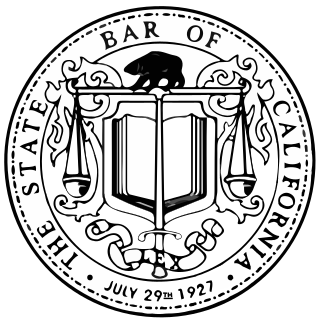Related Research Articles

A barrister is a type of lawyer in common law jurisdictions. Barristers mostly specialise in courtroom advocacy and litigation. Their tasks include arguing cases in courts and tribunals, drafting legal pleadings, researching the law and giving legal opinions.

A notary public of the common law is a public officer constituted by law to serve the public in non-contentious matters usually concerned with general financial transactions, estates, deeds, powers-of-attorney, and foreign and international business. A notary's main functions are to validate the signature of a person ; administer oaths and affirmations; take affidavits and statutory declarations, including from witnesses; authenticate the execution of certain classes of documents; take acknowledgments ; provide notice of foreign drafts; provide exemplifications and notarial copies; and, to perform certain other official acts depending on the jurisdiction. Such transactions are known as notarial acts, or more commonly, notarizations. The term notary public only refers to common-law notaries and should not be confused with civil-law notaries.
A solicitor is a legal practitioner who traditionally deals with most of the legal matters in some jurisdictions. A person must have legally-defined qualifications, which vary from one jurisdiction to another, to be described as a solicitor and enabled to practise there as such. For example, in England and Wales a solicitor is admitted to practise under the provisions of the Solicitors Act 1974. With some exceptions, practising solicitors must possess a practising certificate. There are many more solicitors than barristers in England; they undertake the general aspects of giving legal advice and conducting legal proceedings.

Legal education is the education of individuals in the principles, practices, and theory of law. It may be undertaken for several reasons, including to provide the knowledge and skills necessary for admission to legal practice in a particular jurisdiction, to provide a greater breadth of knowledge to those working in other professions such as politics or business, to provide current lawyers with advanced training or greater specialisation, or to update lawyers on recent developments in the law.

A paralegal, also known as a legal assistant, or paralegal specialist is a legal professional who performs tasks that require knowledge of legal concepts but not the full expertise of a lawyer with an admission to practice law. The market for paralegals is broad, including consultancies, companies that have legal departments or that perform legislative and regulatory compliance activities in areas such as environment, labor, intellectual property, zoning, and tax. Legal offices and public bodies also have many paralegals in support activities using other titles outside of the standard titles used in the profession. There is a diverse array of work experiences attainable within the paralegal field, ranging between internship, entry-level, associate, junior, mid-senior, and senior level positions.

A notary is a person authorised to perform acts in legal affairs, in particular witnessing signatures on documents. The form that the notarial profession takes varies with local legal systems.

A scrivener was a person who, before the advent of compulsory education, could read and write or who wrote letters as well as court and legal documents. Scriveners were people who made their living by writing or copying written material. This usually indicated secretarial and administrative duties such as dictation and keeping business, judicial, and historical records for kings, nobles, temples, and cities. Scriveners later developed into notaries, court reporters, and in England and Wales, scrivener notaries.

The law of Japan refers to the legal system in Japan, which is primarily based on legal codes and statutes, with precedents also playing an important role. Japan has a civil law legal system with six legal codes, which were greatly influenced by Germany, to a lesser extent by France, and also adapted to Japanese circumstances. The Japanese Constitution enacted after World War II is the supreme law in Japan. An independent judiciary has the power to review laws and government acts for constitutionality.
A bar examination is an examination administered by the bar association of a jurisdiction that a lawyer must pass in order to be admitted to the bar of that jurisdiction.
The Law of the People's Republic of China, officially referred to as the socialist legal system with Chinese characteristics, is the legal regime of China, with the separate legal traditions and systems of mainland China, Hong Kong, and Macau.

The State Bar of California is an administrative division of the Supreme Court of California which licenses attorneys and regulates the practice of law in California. It is responsible for managing the admission of lawyers to the practice of law, investigating complaints of professional misconduct, prescribing appropriate discipline, accepting attorney-member fees, and financially distributing sums paid through attorney trust accounts to fund nonprofit legal entities. It is directly responsible to the Supreme Court of California; however, its trustees are now appointed by the Supreme Court, the California Legislature, and Governor of California. All attorney admissions are issued as recommendations of the State Bar, which are then routinely ratified by the Supreme Court. Attorney discipline is handled by the State Bar Office of Chief Trial Counsel, which acts as prosecutor before the State Bar Court of California. The State Bar has been cited for its corrupt practices during the 21st century, and is subject to reforms issued by its governing body, the California Supreme Court.

In Poland, any person holding a Magister's degree in law is called a "jurist" or "lawyer". According to Polish legal doctrine, a lawyer should be understood as a person who graduated from law school with the aforementioned degree, even if such a person does not practice law after graduation.
A tax advisor or tax consultant is a person with advanced training and knowledge of tax law. The services of a tax advisor are usually retained in order to minimize taxation while remaining compliant with the law in complicated financial situations. Tax Advisors are also retained to represent clients before tax authorities and tax courts to resolve tax issues.
Administrative guidance is non-binding advice given by an administrative agency to the public regarding how best to comply with a particular law or regulation. It may also be referred to by terms such as "advice" or "recommendation." Guidance is often used to explain the objective or interpretation of a vague or nonspecific law or requirement.
A legal secretary is a particular category of worker within the legal profession.
An admission to practice law is acquired when a lawyer receives a license to practice law. In jurisdictions with two types of lawyer, as with barristers and solicitors, barristers must gain admission to the bar whereas for solicitors there are distinct practising certificates.
"Judicial scrivener" is a term used to refer to similar legal professions in Japan, South Korea and Taiwan. Judicial scriveners assist clients in commercial and real estate registration procedures and in the preparation of documents for litigation.
In Japan, attorneys at law form the base of the country's legal community.

A legal document assistant in the United States is a person who is a non-lawyer but authorized to assist with the preparation of legal instruments. Unlike a paralegal, legal document assistants do not work under the supervision of an attorney.
The legal system of Ukraine is based on civil law, and belongs to the Romano-Germanic legal tradition. The main source of legal information is codified law. Customary law and case law are not as common, though case law is often used in support of the written law, as in many other legal systems. Historically, the Ukrainian legal system is primarily influenced by the French civil code, Roman Law, and traditional Ukrainian customary law. The new civil law books were heavily influenced by the German Bürgerliches Gesetzbuch.
References
- ↑ The Article 72 of the Attorney Act